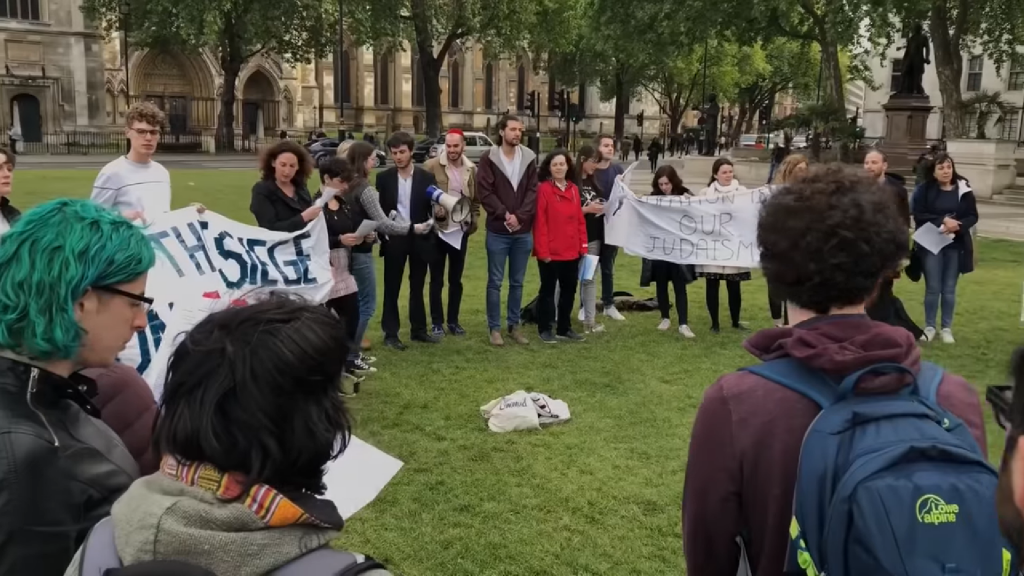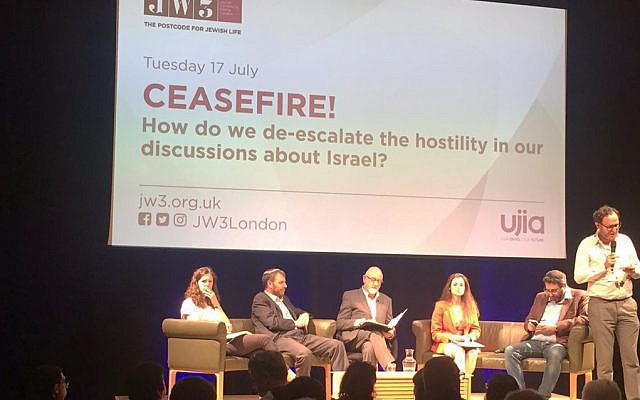Verbal barbs as right and left-wing Jews clash at Israel talk
UJIA-sponsored attempt to offer dialogue between opposing communal views at time descends into bad tempered yelling at JW3
Jenni Frazer is a freelance journalist
A UJIA-sponsored attempt to broker dialogue between two opposing sides of the community on how best to support Israel at times descended into a bad-tempered shouting match between right and left wingers – and ended with both sides apparently as far apart as ever.
Ceasefire was the optimistically-entitled event held on Tuesday at London’s JW3, the first of what UJIA hopes will be a series of discussions.
But although moderator Henry Grunwald QC and JW3 chief executive Raymond Simonson made it clear from the start that they were looking for “civilised” exchanges of opinion, this was often lacking during the event.
“Diversity is not heresy,” Grunwald declared, but that largely fell on deaf ears.
Instead, the audience was fairly evenly divided between right-wing activists — one woman draped in an Israeli flag — and others who had either taken part in, or were supporters of, the now notorious “Kaddish for Gaza” on Parliament Square several weeks ago.
Grunwald introduced the night’s panel, but their input was deliberately diminished
in favour of audience participation.

The task of Adrian Cohen (chair of the London Jewish Forum and Labour Friends of Israel), Ella Rose, (director of Jewish Labour Movement), Natasha Hausdorff and Rabbi Andrew Shaw (chief executive of Mizrachi UK), was to kick-start the discussion by offering answers to two central questions: how to respond to people in the community who were “uncomfortable” at the direction taken by the Israeli Government, and what should be said to members of the community who were “profoundly disturbed” at those who expressed their opposition to the direction of the Israeli Government.
Cohen said he was conscious of the “extreme anger and language” used in recent weeks, but counselled that “shouting and emoting are self-defeating”.
Hausdorff, a barrister who is a director of UK Lawyers for Israel, suggested a variety of ways in which people could make their views heard, including calling Israeli radio stations or even going to Israel “to take part in anti-Bibi demonstrations”. But, she said, more important was to redress the balance of the “twisted and skewed narrative on Israel” and the “lies which have permeated throughout the community and the country”.
Shaw observed that “in today’s PC society everyone has an opinion, but you can’t sing ‘kumbaya’ to Hamas”.
Rose, however, felt that “all opinions matter” – but declared “if Bibi chooses to speak in my name, as a Jew, I have the right to call it out”.
Even allowing for a breadth of opinions, however, Rose believed that there had been “some disgraceful things” that had happened in the community in recent weeks.
“Everyone is entitled to an opinion,” she said, “but it’s about the way you express it. There has been language [used] which is not becoming of our community.”
Much of the ensuing contributions which followed from the audience, however, were split clearly along generational lines as well as right and left — older people tending to back right-wing points of view, younger people siding with those on the left or those disaffected with the organised Jewish community.
The blogger Jonathan Hoffman, who announced himself as one of two people who had identified “the ringleaders” of the Kaddish for Gaza event, insisted that claims of abusive language in response to the publicity was “un-evidenced” and “a smokescreen to deflect attention from the act itself”.
But other members of the audience insisted that not only had there indeed been abusive language, but a number of distressing examples were read out.
One posting on social media had hoped that one of the Kaddish for Gaza participants died. Another wrote: “Are you even Jewish? I want to see your mother’s ketubah, you half-breed”.
Audience member David Krikler spoke half-despairingly of two new tribes — the “gevalt-right and the gevalt-left”.
Shaw was obliged to clarify that there was no longer any link between Mizrachi UK and any Israeli political party, specifically the hard-right Jewish Home party.
One audience member said optimistically: “There is much more that puts us on the same side than we think – if we listen to each other”.
That, however, did not seem likely as the event concluded.
Nevertheless, UJIA chair Louise Jacobs announced that Ceasefire was the first of a number of dialogue events, some public, some lower-key, in which UJIA wanted to bring together different strands of the community to discover how best to support Israel. She said that more events would be rolled out until the autumn.
Listen to this week’s episode of the Jewish Views!

Thank you for helping to make Jewish News the leading source of news and opinion for the UK Jewish community. Today we're asking for your invaluable help to continue putting our community first in everything we do.
For as little as £5 a month you can help sustain the vital work we do in celebrating and standing up for Jewish life in Britain.
Jewish News holds our community together and keeps us connected. Like a synagogue, it’s where people turn to feel part of something bigger. It also proudly shows the rest of Britain the vibrancy and rich culture of modern Jewish life.
You can make a quick and easy one-off or monthly contribution of £5, £10, £20 or any other sum you’re comfortable with.
100% of your donation will help us continue celebrating our community, in all its dynamic diversity...
Engaging
Being a community platform means so much more than producing a newspaper and website. One of our proudest roles is media partnering with our invaluable charities to amplify the outstanding work they do to help us all.
Celebrating
There’s no shortage of oys in the world but Jewish News takes every opportunity to celebrate the joys too, through projects like Night of Heroes, 40 Under 40 and other compelling countdowns that make the community kvell with pride.
Pioneering
In the first collaboration between media outlets from different faiths, Jewish News worked with British Muslim TV and Church Times to produce a list of young activists leading the way on interfaith understanding.
Campaigning
Royal Mail issued a stamp honouring Holocaust hero Sir Nicholas Winton after a Jewish News campaign attracted more than 100,000 backers. Jewish Newsalso produces special editions of the paper highlighting pressing issues including mental health and Holocaust remembrance.
Easy access
In an age when news is readily accessible, Jewish News provides high-quality content free online and offline, removing any financial barriers to connecting people.
Voice of our community to wider society
The Jewish News team regularly appears on TV, radio and on the pages of the national press to comment on stories about the Jewish community. Easy access to the paper on the streets of London also means Jewish News provides an invaluable window into the community for the country at large.
We hope you agree all this is worth preserving.






















